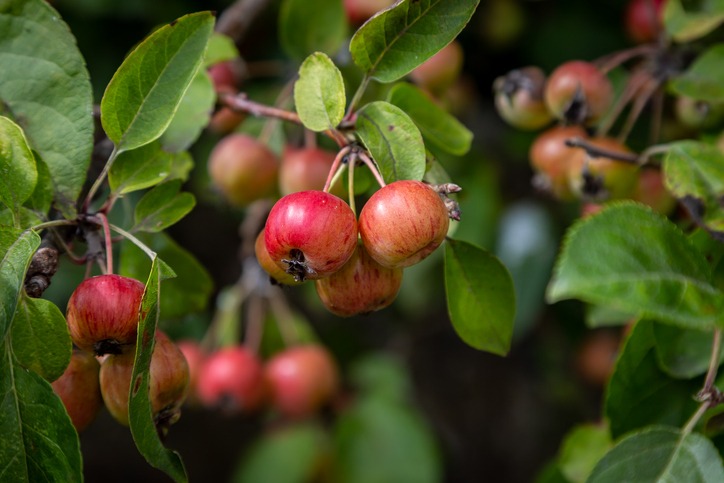Enhancing Privacy and Beauty in Your Garden

Urban spaces are ever-expanding, and privacy is becoming an increasingly coveted commodity. For homeowners, the garden is often seen as a sanctuary—a personal retreat from the hustle and bustle of daily life. However, the close proximity of neighbours and the prevalence of small plots can make it challenging to achieve the sense of seclusion many desire. Fortunately, there is a solution that not only enhances privacy but also adds aesthetic value and practical benefits to your outdoor space: integrating fruit trees and other natural elements into your garden design.
The Dual Purpose of Fruit Trees
Fruit trees offer an elegant and sustainable way to address two key concerns for any gardener—privacy and beauty. Unlike rigid fences or artificial screens, fruit trees create a living, breathing barrier that softens the boundaries of your garden while also yielding delicious produce. With their dense foliage, seasonal blossoms, and the promise of a fruitful harvest, they bring life and vibrancy to any outdoor setting.
According to a guide from the fruit trees store at Fruit-Trees.com, "Fruit trees are not only a practical investment for those seeking privacy; they also enhance the overall biodiversity of your garden. By carefully selecting varieties suited to your local climate and soil, you can create a thriving ecosystem that supports pollinators and other beneficial wildlife." This professional advice underscores the importance of thoughtful planning when incorporating fruit trees into your garden.
Designing for Privacy: The Role of Trees and Shrubs
When considering how to improve privacy in your garden, it’s essential to think vertically as well as horizontally. Strategic planting can create natural screens that shield your space from view while maintaining an open, airy feel. Fast-growing fruit trees, such as plums or pears, can quickly form a leafy curtain, while slower-growing varieties, like apple trees, offer a more deliberate and sculptural addition to your landscape.
In addition to their practical function, fruit trees provide a stunning visual element throughout the year. In spring, they burst into bloom, filling your garden with colour and fragrance. During summer and autumn, their branches are laden with fruit, adding texture and interest. Even in winter, the bare branches of a well-pruned tree can serve as an architectural focal point, casting intricate shadows across the frosty ground.
For those who want immediate impact, companion planting with shrubs can further enhance privacy. Species such as holly, laurel, or flowering currant work well alongside fruit trees, creating a layered effect that combines different heights, textures, and colours. This approach not only boosts privacy but also provides a richer habitat for birds, insects, and other garden creatures.
Choosing the Right Fruit Trees for Your Garden
Selecting the right fruit trees for your garden requires careful consideration of several factors, including the size of your plot, the local climate, and the specific privacy needs you wish to address. While it may be tempting to choose trees based solely on their fruit or aesthetic appeal, it’s essential to think about how they will perform over time.
For smaller gardens, dwarf or semi-dwarf fruit trees are an excellent option. These compact varieties offer all the benefits of their full-sized counterparts without overwhelming the space. They are particularly well-suited to urban environments, where maintaining a balance between privacy and openness is crucial. If space is extremely limited, espaliered fruit trees—trained to grow flat against a wall or fence—can provide an elegant solution.
Larger gardens offer more flexibility, allowing for the inclusion of standard-sized fruit trees, which can grow to impressive heights and widths. These trees create a more substantial privacy barrier and offer the added benefit of ample shade during the warmer months. Popular choices include sweet cherry and walnut trees, which not only serve as effective screens but also produce an abundant harvest.
Planting and Care: Ensuring Long-Term Success
Once you’ve chosen the ideal fruit trees for your garden, proper planting and care are essential to ensure their health and longevity. Most fruit trees prefer well-draining soil and a sunny location, although some varieties, such as plum and damson, can tolerate partial shade. Before planting, it’s crucial to prepare the soil by adding organic matter, such as compost or well-rotted manure, to provide the necessary nutrients.
During the first few years, when young trees are putting down roots, watering is very important. Putting mulch around the tree's base can help it stay moist and keep weeds away, since they fight with the tree for nutrients. It's also important to prune the tree often to keep it in shape, promote healthy growth, and get the most fruit out of it.
For those new to fruit tree cultivation, seeking advice from a reputable nursery can provide valuable insights. Their specialists can guide you through the process, from selecting the right varieties to offering tips on pest management and disease prevention.
The Aesthetic Appeal of a Well-Planned Garden
Beyond privacy, the addition of fruit trees can transform the aesthetic appeal of your garden, creating a space that is both visually stunning and deeply personal. The interplay of light and shadow through the leaves, the changing colours of foliage, and the progression of fruit from blossom to harvest all contribute to a dynamic and ever-evolving landscape.
Incorporating fruit trees into a broader garden design can also help to unify the space. By considering factors such as tree placement, complementary planting, and the use of pathways or seating areas, you can create a cohesive and harmonious environment. For instance, a pair of flowering cherry trees flanking a garden bench can frame a quiet seating area, while a row of espaliered apple trees along a path can lead the eye through the garden, adding a sense of depth and intrigue.
Moreover, fruit trees often evoke a sense of nostalgia, reminding us of traditional British orchards and the pleasures of homegrown produce. This connection to nature and heritage can make your garden feel like a timeless refuge, offering solace and inspiration in equal measure.
Environmental Benefits and Sustainability
In addition to their aesthetic and practical advantages, fruit trees play a crucial role in promoting environmental sustainability. By planting fruit trees, you are contributing to the fight against climate change, as trees absorb carbon dioxide and produce oxygen. They also help to improve air quality, reduce noise pollution, and mitigate the urban heat island effect.
Fruit trees are particularly beneficial for supporting local biodiversity. Their blossoms attract bees, butterflies, and other pollinators, which are essential for maintaining healthy ecosystems. Birds, too, are drawn to fruit trees, using their branches for nesting and feeding on insects and fruit. This symbiotic relationship between fruit trees and wildlife creates a thriving garden environment that benefits all.
From a sustainability perspective, growing your own fruit reduces reliance on imported produce, lowering your carbon footprint and promoting self-sufficiency. Whether it’s picking cherries for a summer dessert or harvesting apples for a homemade cider, the simple act of enjoying homegrown fruit can foster a deeper appreciation for the natural world.
The Joy of Cultivating a Productive Garden
For many, the true joy of gardening lies in its rewards, both tangible and intangible. The process of nurturing fruit trees, watching them grow, and ultimately reaping their bounty is deeply satisfying. It provides a sense of accomplishment and connection to the land that few other activities can match.
As your fruit trees mature, you may find that they become a central feature of your garden, drawing friends and family together for seasonal gatherings and harvest celebrations. The ritual of picking fruit, sharing it with loved ones, and preserving it for future enjoyment creates lasting memories and traditions.
Furthermore, cultivating fruit trees offers numerous health benefits. Gardening is a physical activity that promotes well-being, while the fresh, organic fruit from your trees provides a nutritious and delicious addition to your diet. This holistic approach to gardening, where beauty, privacy, and productivity converge, exemplifies the best of what a garden can offer.
Conclusion: Creating a Garden That Grows With You
Enhancing privacy and beauty in your garden through the strategic use of fruit trees is a timeless and rewarding endeavour. By choosing the right varieties, planting them thoughtfully, and caring for them diligently, you can create a space that is not only private and peaceful but also rich in character and life.
Whether you’re looking to buy fruit trees for a small urban plot or a sprawling countryside garden, the possibilities are endless. With expert guidance from nurseries and a bit of patience, your garden can become a sanctuary that evolves and flourishes for years to come. In doing so, you’ll not only enhance your own quality of life but also contribute positively to the environment and the wider community.
In the end, a garden is more than just a collection of plants; it is a reflection of its caretaker’s vision, values, and aspirations. By embracing the natural beauty and practical benefits of fruit trees, you can create a garden that offers privacy, sustenance, and a profound connection to the world around you.




